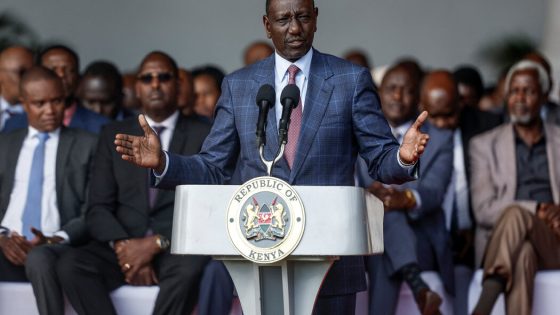In a sudden reversal, President William Ruto of Kenya announced on Wednesday that he would not sign a finance bill that he had long said would stabilize the country’s economy — a response to devastating protests a day earlier that left nearly two dozen people dead.
Though the precise toll was still being tallied, human rights groups said that 23 people were killed and over 300 others injured after the police used tear gas and bullets to respond to demonstrators who had marched on Parliament to protest the tax increases in the bill.
Some people broke into the Parliament building and set it on fire hours after lawmakers voted to pass the legislation. The death toll makes Tuesday’s violence one of the bloodiest days in the country’s recent history.
“Listening keenly to the people of Kenya who have said loudly that they want nothing to do with this finance bill, I concede, and therefore, I will not sign the 2024 finance bill, and it shall subsequently be withdrawn,” Mr. Ruto said in an address to the country on Wednesday.
Among those sitting behind him were lawmakers who, just a day earlier, had passed the bill in Parliament, some while being loudly condemned by their constituents for supporting the legislation.
The announcement was a change of course for Mr. Ruto, who in an address on Tuesday night had called the demonstrators “dangerous criminals” and “treasonous,” and deployed the military to join the police in quashing the protests.
Mr. Ruto’s government introduced the finance bill last month to raise revenue by imposing additional taxes. The government said the bill was necessary to pay the country’s enormous debt, avoid defaulting on loans and to cover the costs of roads, rural electrification and farming subsidies.
But the legislation stoked widespread discontent among the public, with opponents arguing that it would onerously increase the cost of living. Critics of the bill also pointed to the lavish lifestyles of Mr. Ruto and members of his administration, and called on officials to limit their expenses. Mr. Ruto also said his office would cut spending on travel, cars and office renovations and proposed that other government branches do so.
Young protesters, who observers say largely initiated and guided the demonstrations, were also incensed by the dismissive way in which some leaders had addressed their concerns. Mr. Ruto said his government would engage with the young people and a broad range of groups in the next two weeks to chart a new economic course.
On Tuesday, as lawmakers debated and voted on the finance bill, protesters in Nairobi marched to Parliament to urge them to back down. But Mr. Ruto’s coalition, which has a majority in Parliament, quickly passed the legislation.
A tense mood lingered in major cities across Kenya on Wednesday after protesters on Tuesday stormed Parliament and set parts of it ablaze in actions that Mr. Ruto said posed an “existential danger” to the East African nation.
Some protesters vowed to march again on Thursday to protest the crackdown and mourn those killed.
Political analysts said on Wednesday the president remained besieged on multiple fronts and faced crucial tests to his leadership.
“He scuppered a great deal of good will,” said Nanjala Nyabola, a Kenyan analyst who writes about how the internet has affected the country’s politics. “While he might survive this moment, he has pushed Kenya into such deep, uncharted territory.”
Roseline Odede, the chairwoman of the Kenya National Commission on Human Rights, a state agency, told a news conference on Wednesday that the group would start an inquiry into Tuesday’s violence.
“It violates a lot of rights in terms of response,” Ms. Odede said.
The state agency put the death toll at 22, while the independent Kenya Human Rights Commission and the Police Reforms Working Group, a coalition of grass-roots organizations, cited 23 dead.
Although businesses were slowly reopening across the country on Wednesday, newspapers being sold on the streets of Nairobi, the capital, captured the chaos of the previous day. “Pandemonium,” the front page of the Daily Nation newspaper said. “Deaths, chaos, rage,” The Star newspaper declared.
“I am shocked and sad and fuming,” said John Thwagi, a taxi driver who had ventured into the city. “The death and destruction is so unbelievable and so unnecessary.”
The nationwide protests have been leaderless, with young protesters using social media to organize and directly address their lawmakers. Observers say that a large majority of the protesters are members of Gen Z, the generation born in the mid to late 1990s and early 2000s.
Many had taken to platforms like X and TikTok to agitate against the bill — and to also tell politicians to stay away from the demonstrations and not threaten their movement.
Several people have also put out calls on social media about friends, colleagues and family members who were last seen during the protests on Tuesday.
Activists also say a wave of abductions occurred in the days and hours leading up to the demonstrations and that the disappearances have continued in the aftermath of the violence.
About 50 young Kenyans have been abducted, said Faith Odhiambo, the president of the Law Society of Kenya. Those missing had been vocal about their opposition to the tax bill, were threatened, physically trailed and had their communications monitored, she said.
Rights groups have long accused Kenya’s police force of kidnappings and extrajudicial disappearances. The disappearances have rattled the country, and prompted chief justice Martha Koome to condemn the alleged abductions on Tuesday.
Mr. Ruto said in his speech that all those who had been missing were “found in police custody and those that were already processed were already released.”
Kasmuel McOure, a musician who had been at the forefront of protests on Tuesday, remained missing, Ms. Odhiambo said.
In an interview with The New York Times on Sunday, Mr. McOure said he had previously been threatened and accosted by people who he thought were plainclothes officers. “No matter what they do, we will remain unbowed,” he said.
On Wednesday, one prominent protester, who declined to be named for safety reasons, said that he had survived an abduction attempt and was in hiding. The protester said that several men had tried to force him into a car near his home, but that he ran away after members of the public stepped in.
Tensions gripped the capital soon after lawmakers approved the finance bill on Tuesday, with large crowds reaching Parliament, scaling its walls and pillaging parts of the facilities. After sundown, Defense Minister Aden Duale said he would deploy the military to support the police in dealing with the “security emergency” in the country. The Law Society of Kenya called the minister’s move “unconstitutional” and sued to stop the deployment.
An hour later, Mr. Ruto struck an uncompromising tone in a televised speech, calling the demonstrators “criminals pretending to be peaceful protesters.”
“I assure the nation that the government has mobilized all resources at the nation’s disposal to ensure that a situation of this nature will not recur again at whatever cost,” Mr. Ruto said.
On Wednesday, the strong smell of tear gas still wafted through the air in downtown Nairobi. A burned car sat next to the City Hall offices that protesters had breached. Across the street, the fence at the entrance to the Supreme Court complex was destroyed.
Source Agencies




